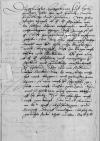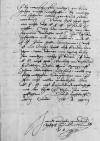Dem durchlauchtenn, hochgebornenn furstenn und hern, hern ⌊Albrechten⌋, / von Gots gnaden marggraff zu ⌊Brandenburg⌋ etc. und in ⌊Prewssen⌋ hertzog etc. unserm hochgunstigenn, lyben hernn und freundt
Durchlauchter, hochgeborner furst, hochgunstiger, lÿber her und freundt. / Unser freuntliche dinst zuvoran. /
Wir haben jestriges thagess Ewer Furstlichen Durchlaucht ⌊⌋ von der selbten dÿner entpfangen / und mit whemutigem hertzen dass jennige, so Ewer Durchlaucht auss gemeÿnnemm geruchte erfharn, / gelesen. / Sein doch der hoffnung zu Gotthe, / dyweÿl von koniglichen hove nichts der gleichen wirde angetzeÿgt, / dass im kortzen wass bessers wirt ankomen. / Es hatt auch Ewer Furstliche Durchlaucht furstlich und wolgethan zu schickennn, umb gruntliche wÿssenheÿtt zu habennn, / der wir mit sondremm vleÿs dancken, / das dÿ uns solchs nicht hat woldt bergen, / und gedachten ÿren dÿner, / so wir wass zu schreÿben gesintt, / an unss lassen gelangenn, / hirumb so halde wir auch eÿnnen bothenn uff dÿ farth, / so der gleichen unss wass vor kompt, / den an al sewmenn an koniglichen hoff abzuferthigen, / und dennoch doruff warthen, / ab sich dis geruchte sterker thett machen, / das Ewer Furstliche Durchlaucht ( so dy was schreÿben wolthe ) ÿre brive hieher mechte vorschaffen, / dÿ welche mit sycherem vleis geantwurt sollen werden etc. Newes dyse zeÿt hab wir nichts, dass Ewer Furstliche Durchlaucht zu stunde zu wÿssen, / wÿ der Walache von den seÿnnenn vorlassen, und dÿ zum ⌊Thurken⌋ gefhallenn, und er vortrÿbennn, / wirdt Ewer Furstliche Durchlaucht zuvor haben vornhomen. / Unss ÿst nun lange zeÿtt auss fremden orthern, / von dannen wir teglich brive sein warthen, / nichts zu komenn. / Ist, das Ewer Durchlaucht wass hatt, / nemlich von unsermm freuntlichen, lyben hern ⌊marggraff Iohans Albrechten⌋, / auch sunst, / wolde uns solchs mÿttheÿlen, / dergleichen wir zu thun nicht wollen underlassen, / dan Ewer Furstliche Durchlaucht vÿl freundtdinstwÿllicheÿtt mit der thatt zu thun / sein wir geflyssenn. /
⌊Joannes⌋, vonn Gots gnadennn byschoff zu ⌊Ermelanndt⌋.
⌊Ioannes⌋ episcopus Varmiensis subscripsit


